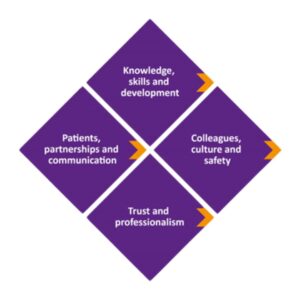
This year the General Medical Council (GMC) published updates to the Good Medical Practice. These guidelines set professional standards to help you care for patients and collaborate with colleagues.
Medical Defence Shield presented a live webinar exclusively for their members earlier this month. The session was presented by Rachel Ball, Regional Liaison Advisor with the General Medical Council (GMC).
Rachel discussed the purpose and structure of the guidelines and explained the key changes. After the main presentation, Rachel opened the floor for attendees to ask questions which were answered by Rachel as well as the legal experts from MDS.
We have summarised these changes in a concise format to give you a brief introduction to the themes and purpose of the updates.
The Five Key Themes
Good Medical Practice (GMP) focuses on encouraging a standard quality of behaviours and values for Healthcare professionals.The GMP aims to support good team work, ensure everyone feels safe to speak up, and empowers doctors to provide quality care.
 In particular, the GMC identified five key themes to inform the updates:
In particular, the GMC identified five key themes to inform the updates:
- Create respectful, fair and compassionate workplaces for colleagues and patients.
- Promote patient centred care.
- Tackle discrimination.
- Champion fair and inclusive leadership.
- Support continuity of care and safe delegation.
These thematic aims are to be achieved by strategic updates to each of the GMP domains.
The four main domains are divided into categories of purpose, and each aims to tackle a different set of patient care standards.
The changes made are set out below for each domain:
Domain 1: Knowledge, Skills, and Development.
- Competence:
- Leadership: Emphasises the need for competence in formal leadership roles in addition to management, research, and teaching.
- Staying Updated: Shift from “be familiar with” to “keep up to date with” guidelines, stressing an active approach.
- Compliance: Added specificity by including “professional standards” in the requirement to follow laws and guidelines
- Language Proficiency:
- Unchanged: Maintains the requirement for necessary English language knowledge for practice and care in the UK.
- Clinical Care:
- Partnership: Stronger focus on working in partnership with patients to assess needs and priorities, reflecting a collaborative approach in care.
Domain 2: Patients, Partnership, and Communication
- Respect and Privacy:
- Intimate Examinations: New guidance on following protocols for intimate examinations and the use of chaperones.
- Patient Choice: Emphasis on patient’s right to choose and seek second opinions.
- Fair Treatment:
- Non-Discrimination: Consolidated multiple paragraphs to stress treating patients fairly and without discrimination.
- Transparency: New requirements for openness about any personal interests that may affect patient care.
- Information Sharing:
- Decision Making: Incorporates principles from decision-making and consent guidance to ensure patients have the information needed to make informed decisions.
- Patient Support: Focuses on supporting patients in self-care and health improvement decisions.
Domain 3: Communication
- Dialogue:
- Listening and Responding: Expanded requirements to encourage open dialogue and honest responses to patient questions.
- Clarity: New focus on ensuring information provided to patients is clear, accurate, and up to date.
Domain 4: Maintaining Trust
- Transparency and Conflicts of Interest:
- Openness: Emphasises the need for transparency about any conflicts of interest, particularly during consent discussions.
- Professional Guidance: Draws attention to following detailed guidance on financial and commercial arrangements.
If you would like to read more about the detailed changes, the full document provides specific paragraph references and exact wording updates from the 2013 to the 2024 versions. You can find it on the GMC website.
To find out more about MDS, how to become a member and gain exclusive members only access to future webinars like these, please visit the website.
